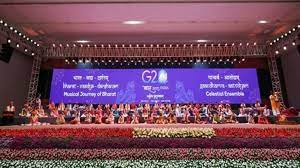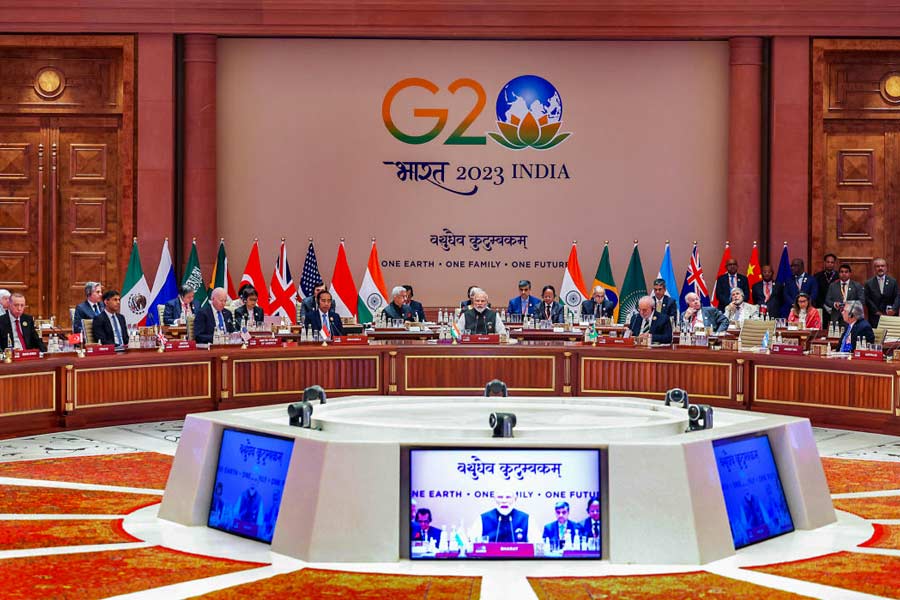By: Rayees Masroor
The 18th G20 Summit of 2023 concluded in New Delhi, marking the first ever G20 summit hosted by India.The summit’s theme, “VasudhaivaKutumbakam” or “One Earth, One Family, One Future” is rooted in ancient Indian tradition and the goal of sustainable development.The summit is India’s diplomatic milestone with its G20 presidency serving as a platform to showcase the country’s rise as a key global player and a rising economic power. Interestinglythe timing of the G20 Summit was also opportune, following India’s successful moon landing under the Chandrayaan-3 program.
In the G20 New Delhi declaration,all 83 paragraphs of the declaration were unanimously approved, achieving a remarkable 100 percent consensus, even with China and Russia in agreement.it is widely believed that India has successfully positioned itself as a champion for developing and underdeveloped nations and seeks to align this with its ambitions for a permanent seat on the UNSC.During the summit it was quite significant to see consensus being achieved on diverse global issues, from Russia-Ukraine tensions to sustainable development, food security, and launching the Global Biofuel Alliance.
After months of hectic India-led negotiations on language concerning the war in Ukraine, G20 members finally found a formulation they could agree on, toning down wording on Russia included in last year’s G20 declaration in Bali.It was a significant success for the Indian leadership.The summit also dispels the myth that democracy and development do not go together especially in the postcolonial nations.Over the years,India has not only strengthened its democratic traditions but also sustained economic growth as the fifth largest economy in the world. Such an achievement further highlights the potential of developing societies to achieve remarkable economic accomplishments under democratic framework of governance while refuting the conventional myths.
India’s G20 presidency is also seen as the point at which the G20’s agenda began its transition from being set and directed by the wealthy G7 nations that have dominated it from inception to become more accommodative of the developing world. The New Delhi Declaration has effectively launched India’s status as the leader of the Global South, particularly after it successfully managed to push the inclusion of the 55-member African Union as a permanent member of the G20.
The AU’s membership in the G20 offers an opportunity to reshape global trade, finance, and investment and would provide a greater voice to the Global South within the G20.It allows African interests to be heard and recognized within the G20.The move is also believed to pay dividends when an India steps up its bid for a permanent seat on the UN Security Council.
One of the significant initiatives during the 2023 G20 Summit was the establishment of IMEC, a Memorandum of Understanding (MoU) was signed among the governments of India, the U.S., Saudi Arabia, the European Union, the UAE, France, Germany, and Italy to establish the India Middle East Europe Economic Corridor. IMEC is envisioned as a network of transportation routes encompassing railways and sea lanes. Its primary goal is to foster economic development by promoting integration between Asia, the Arabian Gulf, and Europe.
The project falls under the umbrella of the Partnership for Global Infrastructure Investment, an initiative led by Western nations to support infrastructure projects worldwide.IMEC is actually seen as a response to China’s Belt and Road Initiative (BRI), providing an alternative infrastructure network.
The India led Global biofuel initiative seeks to position biofuels as a key component of the energy transition and contributes to job creation and economic growth,It will help accelerate India’s existing biofuels programs such as PM-JivanYojna, SATAT, and Gobardhan scheme.it aims to develop an alliance of governments,international organizations and industry to promote Biofuels.GBA Members constitute major producers and consumers of biofuels. USA (52%), Brazil (30%) and India (3%), contribute about 85% share in production and about 81% in consumption of ethanol.
The G20 Global Partnership for Financial Inclusion document prepared by the World Bank has lauded the transformative impact of India’s Digital Public Infrastructure(DPI) over the past decade under the Central Government.The document emphasizes the government initiatives that played a greater role in shaping the DPI landscape,some of the key initiatives which led to the rapid financial inclusion includes the (JAM) JhanDhanAdhar Mobile,PMJDY,G2P payments,UPI etc.Regulatory frameworks, national policies, and Aadhaar-based verification complemented DPIs.
New Delhi summit also witnessed a consensus emerging on addressing the climate crisis, signalling a significant victory for India and the world. Contentious issues included commitments to reduce fossil fuel use, increasing renewable energy targets, and lowering greenhouse gas emissions, which faced objections from China and Saudi Arabia.
The G20 nations collectively contribute to approximately 80 percent of global emissions.it is as such very important for the members to develop consensus and a common strategy to combat the issue of climate change.The G20 Declaration also featured commitments to mainstream Lifestyle for Environment (LiFE), implement sustainable energy transitions, provide sustainable finance and reaffirmed the pursuit of Sustainable Development Goals (SDGs).
The Summit under India’s leadership marks a remarkable achievement as, for the first time in the history of the G20, the declaration has garnered such a unanimous consensus across all the different areas, including developments, climate concerns, and geopolitical matters. The declaration highlighted India’s unique ability to act as a bridge between emerging economies, developed nations, Russia, and China, effectively bringing them all to the one negotiation table.
Overall, it was a crowning moment for India.The meticulous diplomatic skills and the foreign policy success signalled to the world that India has emerged on the world scene as a rising global power.
Writer is a Freelance columnist and an Academician. rayeesrocks20@gmail.com




